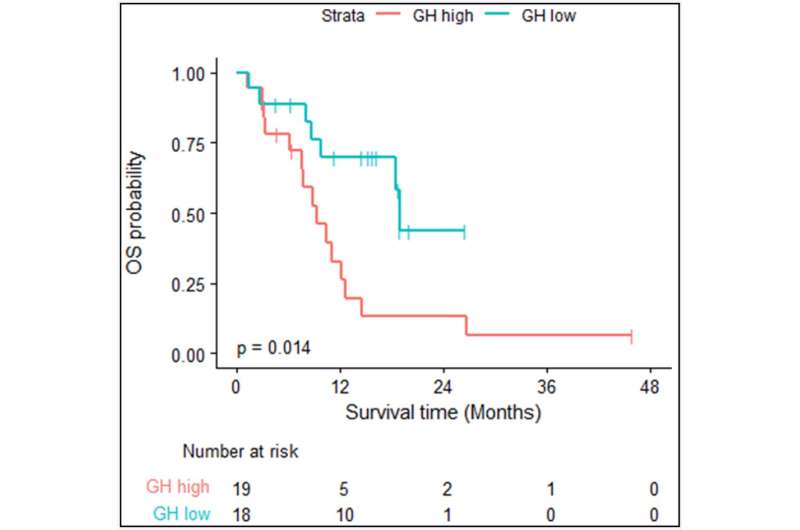Overall survival- log rank test was used; fifteen of the 19 GH-high patients died, the median OS was 9.26 months (95% CI: 7.59, 14.59). Credit: 2022 Mohamed et al.
A new research paper titled "Plasma growth hormone is a potential biomarker of response to atezolizumab and bevacizumab in advanced hepatocellular carcinoma patients" has been published in Oncotarget.
Hepatocellular carcinoma (HCC) has limited systemic therapy options when discovered at an advanced stage. Thus, there is a need for accessible and minimally invasive biomarkers of response to guide the selection of patients for treatment.
In this new study, researchers from MD Anderson Cancer Center, Massachusetts General Hospital, Harvard Medical School, Michigan State University, University of Pennsylvania, and Perelman School of Medicine investigated the biomarker value of plasma growth hormone (GH) level as a potential biomarker to predict outcome in unresectable HCC patients treated with current standard therapy, atezolizumab plus bevacizumab (Atezo/Bev).
"The present study was designed to investigate the association between GH levels and overall survivals (OS) and progression free survival (PFS) in HCC patients treated with current standard, atezolizumab plus bevacizumab," the researchers explain.
The study included unresectable HCC patients scheduled to receive Atezo/Bev. Patients were followed to determine progression-free survival (PFS) and overall survival (OS). Plasma GH levels were measured by ELISA and used to stratify the HCC patients into GH-high and GH-low groups (the cutoff normal GH levels in women and men are ≤3.7 μg/L and ≤0.9 μg/L, respectively). The Kaplan-Meier method was used to calculate median OS and PFS and Log rank test was used to compare survival outcomes between GH-high and -low groups.
Credit: Impact Journals LLC
Thirty-seven patients were included in this analysis, of whom 31 were males and 6 females, with a median age of 67 years (range: 37-80). At the time of the analysis, the one-year survival rate was 70% (95% CI: 0.51, 0.96) among GH low patients and 33% (95% CI: 0.16, 0.67) among GH high patients. OS was significantly superior in GH-low compared to GH-high patients (median OS: 18.9 vs. 9.3 months; p = 0.014). PFS showed a non-significant trend in favor of GH-low patients compared to the GH-high group (median PFS: 6.6 vs. 2.9 months; p = 0.053).
"Plasma GH is a biomarker candidate for predicting treatment outcomes in advanced HCC patients treated with Atezo/Bev. This finding should be further validated in larger randomized clinical trials in advanced HCC patients," the researchers conclude.
More information: Yehia I. Mohamed et al, Plasma growth hormone is a potential biomarker of response to atezolizumab and bevacizumab in advanced hepatocellular carcinoma patients, Oncotarget (2022). DOI: 10.18632/oncotarget.28322
Journal information: Oncotarget
Provided by Impact Journals LLC






















